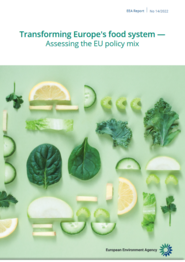Sustainable food systems: European Environment Agency calls for more transformative EU policies
Conventional food production and consumption accounts for one third of greenhouse gas emissions worldwide. It contributes significantly to biodiversity loss and can be detrimental to human health. In many cases, it does not ensure fair economic returns and livelihoods for those involved in the industry. The European Commission has set out a programme for sustainable food systems with the ‘Farm to Fork Strategy’ as part of the European Green Deal, and set ambitious goals in developing an EU legislative framework for sustainable food systems this year. A new report from the European Environment Agency shows that this shift to sustainable food systems will require huge changes in the ways food is being produced and consumed.
The report ‘Transforming Europe's food system – Assessing the EU policy mix’ emphasises the need for ambitious and coherent EU policies that encourage innovation and support behavioural change. In addition, it points to the need to phase out harmful practices and to ensure a just transition to sustainable food systems. The authors analysed EU policies currently shaping European food systems in light of the latest research on the governance of sustainability transitions and food system change. The focus of the examination was on better understanding the interplay of the goals and measures set out in the Farm to Fork Strategy, Common Agricultural Policy (CAP) and Common Fisheries Policy (CFP). The study was conducted by the Institute for Ecological Economy Research (IÖW), the Dutch Research Institute for Transitions (DRIFT) and the Finnish Environment Institute (SYKE) on behalf of and in close cooperation with the European Environment Agency (EEA).
Ways towards creating EU's policy mix for more sustainable food systems
The report concludes that despite the progress made under the European Farm to Fork Strategy, the existing EU policy mix is characterised by gaps and inconsistencies that limit the potential for transformative changes. The report identifies opportunities to make the policy mix more transformative.
“A key problem with the policy mix so far is that the Farm to Fork Strategy has very ambitious goals and contains meaningful measures, but the Common Agricultural Policy and Common Fisheries Policy continue to mainly support conventional, unsustainable practices, thus sometimes hindering a shift in thinking about more sustainable food systems. We therefore recommend far-reaching changes in the funding logic of the Common Agricultural Policy and, in the medium term, the phasing out of practices that are not sustainable,” says transition researcher Florian Kern, who led the study at IÖW.
“It is central to overcome the power of interest groups that oppose sustainable food systems. Diverse actors need to be involved in decision-making processes that determine possible future pathway. In addition, specific incentives and compensations should also be offered to actors who lose out in such processes,” adds Sabine Hielscher from IÖW. “Diverse actors need to be involved in formulating visions for sustainable food systems and pathways towards achieving them.”
The report identifies a number of ways in which EU policies can bring about more transformative changes. The report concludes that to realise the full potential, strategic and coherent approaches are needed. This includes, for example, developing a shared vision of what sustainable food systems could look like. This vision needs to be regionally differentiated and to be developed together with stakeholders who want to drive change. The European Commission must do more within its means to promote the consumption of more sustainable food and at the same time put pressure on those practices in production and processing of food that are not sustainable. For instance, the report points to the need for regulating the advertisement and availability of meat consumption or the consumption of dairy products, which can be questionable from both a health and environmental perspective.
Clear direction for innovation and system change
In the research project, the researchers examined to what extent the current policy mix with which the EU manages the European food system is compatible with the transformative goals of the European Green Deal and how it can shape transformative change. The researchers assessed whether and how the current policy mix promotes new forms of food production and consumption and drives the elimination of unsustainable practices. The main focus was to analyse how socially just transitions can be enabled and whether EU policies are coherent and provide a clear direction for innovation and systemic change.
+++++++++++++++++++++++
For more information on the study:
- On the European Environment Agency (EEA) report ‘Transforming Europe's food system - Assessing the EU policy mix’
Additional information:
- The report was produced in the project ‘Analysis of the EU policy mixes supporting transformation of European production-consumption systems’, carried out by the Institute for Ecological Economy Research (IÖW) on behalf of the European Environment Agency.
- More information on the European Commission's proposal for a legal framework for sustainable food systems, a flagship initiative of the ‘Farm to Fork’ strategy



